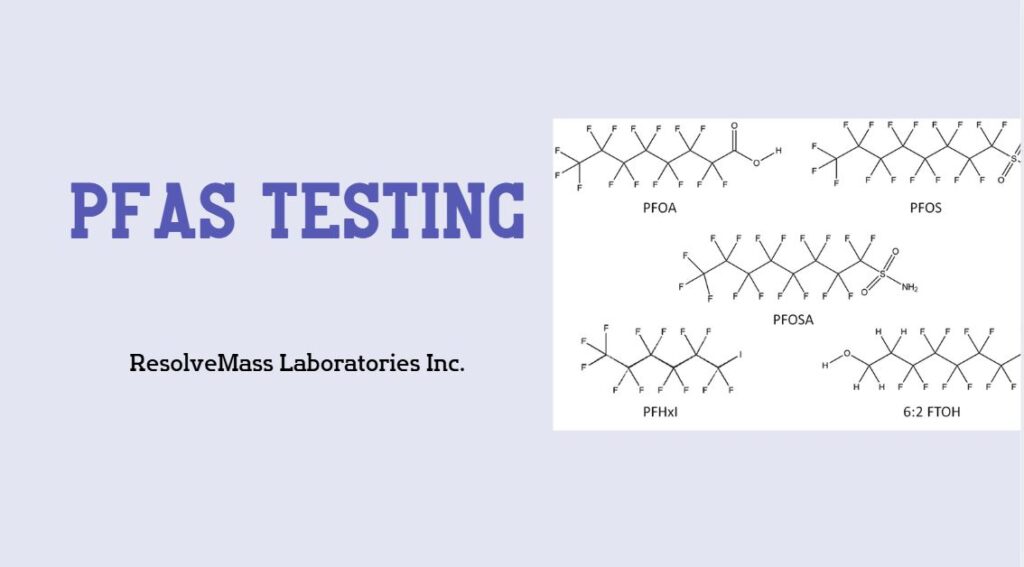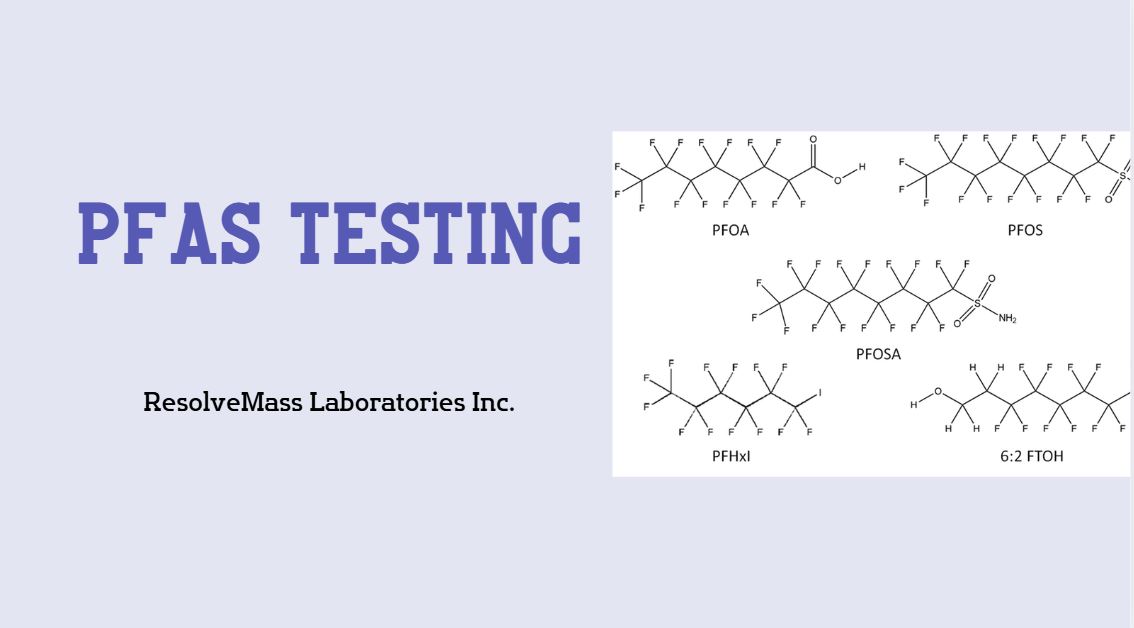Per- and polyfluoroalkyl substances (PFAS) are synthetic chemicals extensively used in various industrial and consumer applications. While their stability and resistance to degradation make them valuable, these properties have also led to their classification as “forever chemicals.” PFAS contamination poses significant environmental and health risks, prompting stringent regulatory oversight. Accurate PFAS testing is critical to ensure compliance with environmental regulations and safeguard public health.
In this comprehensive guide, we will delve into the essential aspects of PFAS testing and explain why choosing the right laboratory is crucial for long-term success in your project. We’ll also highlight why ResolveMass Laboratories Inc. is a leading choice for PFAS testing in Montreal, Canada, the United States, and internationally.

What Are PFAS?
PFAS are a large group of synthetic fluorinated compounds known for their strong carbon-fluorine bonds, which confer exceptional chemical and thermal stability. Common PFAS include:
- PFOA (Perfluorooctanoic acid)
- PFOS (Perfluorooctanesulfonic acid)
- GenX chemicals
Sources of PFAS
- Industrial Processes: Used in non-stick coatings, stain repellents, and firefighting foams.
- Consumer Products: Present in textiles, food packaging, and cosmetics.
- Environmental Contamination: Found in soil, groundwater, and air due to industrial discharge and landfill leachate.
Health and Environmental Impact
PFAS exposure has been linked to various health risks, including:
- Cancer
- Hormonal disruptions
- Immune system impairments
- Developmental delays in children
Their persistence in the environment and bioaccumulation in humans and animals necessitate stringent PFAS environmental testing protocols.
Regulatory Framework for PFAS Testing
Governments worldwide are implementing regulations to monitor and control PFAS contamination.
United States
- EPA Guidelines: The EPA established health advisory limits for PFOA and PFOS at 70 parts per trillion (ppt) in drinking water.
- State Regulations: Many states have enacted their own stricter limits.
Canada
- Health Canada Standards: The Canadian Drinking Water Quality Guidelines set the limit for PFOA and PFOS at 200 ppt and 600 ppt, respectively. PFAS testing Canada ensures adherence to these standards.
Global Standards
- EU Legislation: The EU restricts PFAS under REACH and other environmental directives. PFAS testing Europe plays a vital role in compliance.
Key Factors to Consider When Choosing a PFAS Testing Lab
1. Advanced Analytical Capabilities
Testing PFAS at trace levels requires cutting-edge analytical techniques. The best laboratories utilize:
- Liquid Chromatography-Tandem Mass Spectrometry (LC-MS/MS): Gold standard for PFAS detection.
- High-Resolution Mass Spectrometry (HRMS): Offers unparalleled accuracy and sensitivity.
ResolveMass Laboratories Inc. leverages advanced LC-MS/MS and HRMS systems to detect PFAS at ppt levels, ensuring precise and reliable results.
2. Compliance with Regulatory Standards
Choose a lab that aligns with national and international guidelines. Accredited labs, such as those with ISO/IEC 17025 certification, demonstrate technical competence and adherence to strict quality standards.
3. Expertise and Experience
Experienced professionals are vital for accurate PFAS analysis. Look for labs with:
- A proven track record in PFAS testing US and PFAS testing Canada.
- Expertise in handling diverse matrices, including water, soil, and biological samples.
4. Comprehensive Services
Ensure the lab provides a wide range of PFAS testing services, including:
- Drinking water testing
- Soil and sediment analysis
- Air sampling
- Food and consumer product testing
ResolveMass offers extensive PFAS testing capabilities, including PFAS blood testing Canada, PFAS blood testing UK, and PFAS environmental testing.
5. Turnaround Time
Timely results are essential for regulatory compliance and decision-making. Reliable labs offer fast yet accurate testing services without compromising quality.
6. Cost-Effectiveness
While cost is an important consideration, prioritize value over price. A reputable lab provides transparent pricing, including insights into PFAS blood testing cost, and delivers high-quality results.
ResolveMass Laboratories Inc.: Your Trusted Partner for PFAS Testing
ResolveMass Laboratories stands out for its commitment to quality, precision, and customer satisfaction. Here’s why you should choose us:
- State-of-the-Art Equipment: We use advanced LC-MS/MS and HRMS systems for unparalleled accuracy.
- Experienced Team: Our experts have decades of experience in PFAS analysis and PFAS environmental testing.
- Comprehensive Services: We analyze PFAS across various matrices, including water, soil, and industrial samples, catering to needs in PFAS testing Montreal, PFAS testing Australia, and more.
- Regulatory Expertise: We ensure compliance with Canadian, U.S., and international standards.
- Client-Centric Approach: Our team provides personalized support to meet your specific needs.
Explore our PFAS testing near me services or Contact Us to discuss your requirements.
Technical Insights into PFAS Testing
Sample Preparation
Effective PFAS testing begins with meticulous sample preparation. Common methods include:
- Solid-Phase Extraction (SPE): Concentrates PFAS from water samples for enhanced detectability.
- Protein Precipitation: Removes matrix interferences in biological samples.
Analytical Techniques
- LC-MS/MS: Offers high sensitivity and selectivity for a wide range of PFAS compounds.
- HRMS: Delivers precise quantification and structural identification of PFAS.
Quality Control Measures
ResolveMass adheres to strict quality control protocols, including:
- Use of isotopically labeled standards for accurate quantification.
- Regular calibration of instruments.
- Comprehensive method validation.
Challenges in PFAS Testing
1. Matrix Effects
Complex matrices such as soil and wastewater can interfere with PFAS detection. Advanced analytical methods and isotopic dilution techniques mitigate these challenges.
2. Low Detection Limits
Regulatory limits require detection of PFAS at ppt levels. This necessitates:
- Highly sensitive instruments
- Rigorous sample preparation
3. Evolving Regulations
Keeping up with changing standards is challenging. Partnering with a lab like ResolveMass ensures compliance with the latest guidelines in regions like PFAS testing Canada, PFAS testing US, and PFAS testing Europe.
Industries Requiring PFAS Testing
- Environmental Agencies: Monitor water and soil contamination.
- Manufacturers: Ensure products meet safety standards.
- Healthcare Providers: Assess PFAS exposure in biological samples.
- Research Institutions: Study the environmental and health impacts of PFAS.
Conclusion
Choosing the right laboratory for PFAS testing is critical for compliance, safety, and environmental stewardship. With cutting-edge technology, PhD-level scientists, regulatory expertise, and a commitment to quality, ResolveMass Laboratories Inc. is your trusted partner for PFAS testing Canada, PFAS testing US, PFAS testing Montreal, and beyond.
Explore our PFAS testing services, including free PFAS testing, or Contact Us to discuss your testing needs.
References
- USEPA. (2020). “PFAS Strategic Roadmap 2021-2024.” Available at https://www.epa.gov/pfas.
- Health Canada. (2018). “Guidelines for Canadian Drinking Water Quality: Guideline Technical Document – Perfluoroalkyl and Polyfluoroalkyl Substances (PFAS).” icals Agency. (2021). “PFAS Restriction Proposal.” https://www.canada.ca/en/health-canada/services/environmental-workplace-health/reports-publications/water-quality/water-talk-per-polyfluoroalkyl-substances-drinking-water.html
- Field, J. A., & Jobst, K. J. (2019). “Determination of PFAS in Environmental Samples.”
- Wang, Z., et al. (2017). “A Comprehensive Review of PFAS Properties and Environmental Impacts.”
PFAS (Per- and Polyfluoroalkyl Substances) are synthetic chemicals used in various industries due to their resistance to heat, water, and oil. They are known as “forever chemicals” because they do not break down easily in the environment, leading to accumulation in water, soil, and living organisms. PFAS exposure is linked to health issues such as cancer, hormonal disruptions, and immune system impairments.
You can test your water for PFAS contamination by sending samples to an accredited PFAS testing lab. These labs use advanced techniques like LC-MS/MS to detect trace levels of PFAS compounds.
Common methods for PFAS testing include:
Liquid Chromatography-Tandem Mass Spectrometry (LC-MS/MS): Highly sensitive and selective.
High-Resolution Mass Spectrometry (HRMS): Used for precise quantification and identification.
Solid-Phase Extraction (SPE): A sample preparation technique to concentrate PFAS.
PFAS testing labs are available in many locations. ResolveMass Laboratories offers PFAS testing services in Canada, the US, and internationally, including Montreal. Use online searches to locate labs near you.
The cost of PFAS testing depends on the type of sample (water, soil, blood), the number of compounds analyzed, and the lab. Prices can range from $300 to $1,000 per sample.
Free PFAS testing is occasionally offered by government programs, environmental groups, or research studies. Check local announcements or regulatory bodies for opportunities.
Look for labs with ISO/IEC 17025 accreditation and experience in PFAS testing. ResolveMass Laboratories is one such option in Canada.
The US EPA has set health advisory levels for PFOA and PFOS at 70 parts per trillion (ppt). Some states have adopted stricter limits. Check state-specific regulations for details.
Yes, PFAS blood testing is available in Canada through specialized laboratories. It helps assess exposure levels and potential health risks.
The cost of PFAS blood testing in the UK varies, typically ranging from £200 to £500. The price depends on the lab and the number of PFAS compounds tested.
PFAS exposure is associated with:
Increased risk of cancer
Hormonal and thyroid disorders
Immune system suppression
Developmental delays in children
Liver and kidney issues
PFAS environmental testing involves:
Sample collection (water, soil, air).
Sample preparation using techniques like SPE.
Analytical testing using LC-MS/MS or HRMS.
Data analysis and reporting.
Yes, ResolveMass Laboratories provides PFAS testing services in Montreal, Canada, offering advanced detection and compliance with regulatory standards.
Use water filters certified for PFAS removal.
Avoid non-stick cookware and stain-resistant products.
Choose PFAS-free food packaging and cosmetics.
Stay informed about local contamination.
Install a reverse osmosis or activated carbon filtration system.
Notify local authorities.
Consider using bottled water for drinking and cooking.
Home testing kits are limited and may lack the accuracy of professional labs. For reliable results, send samples to an accredited PFAS testing lab.
Matrix effects: Interferences from complex samples like soil or wastewater.
Low detection limits: Regulatory limits often require detecting ppt levels.
Diverse compounds: PFAS include thousands of chemicals, each requiring specific analysis.
Typical turnaround times range from 2 to 4 weeks, depending on the lab’s workload and the complexity of the analysis.
US EPA Methods: EPA 537.1 and EPA 533 for drinking water.
ISO Standards: ISO 21675 for PFAS testing in water.
Custom methods: Developed by leading labs for specific matrices.
Test annually if you live near potential PFAS sources (e.g., industrial sites or landfills). If PFAS levels are detected, monitor more frequently as advised by professionals.

